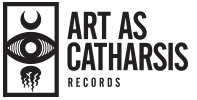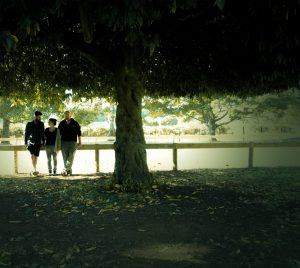Anyone who’s seen one of the numerous bands that Brian O’Dwyer, Gerard Mason or Gelareh Pour perform in tend to walk away with a sense of awe.
The music conveys a sense of passion balanced by technical prowess which, in live settings, unfolds into near hypnotic performances where a sense of noise and improvisation guide every tangible sense in the room. Through sheer luck, these three artists have managed to join forces as MNMM to create something as equally commanding – post-rock dotted with the distinct Iranian elements of a kamancheh (Persian spiked fiddle) and Gelareh’s captivating vocals. In the lead-up to the release of their self-titled debut album, we spoke to drummer Brian O’Dwyer about how the record came to be.
AAC: Just so we’re clear, what instruments are you using on the album? What do you feel each one brings to the mix as far as tones, moods and setting is concerned?
O’Dwyer: It’s a fairly simple setup really, guitar, drum kit, voice, and kamancheh – the Persian spiked fiddle. The kamancheh is likely the least known instrument to Western audiences. It’s a traditional Persian instrument largely used in classical Persian music. It’s an ancestor of the European violin family but is played upright like a cello. It’s sound is somewhat more nasal than that of a violin because the bridge sits atop animal skin, it has a distinctly Middle Eastern feel to it. Gelareh’s playing in MNMM is influenced by Persian classical modes presented in a stripped back way, being a bowed stringed instrument, it lends itself nicely to blending with the droning approach Gerard (Fez) has in his guitar playing. There’s a lot of space within the sound so in terms of drumming and vocals, there’s a lot of opportunity to play around things, either by blending in or complementing.
AAC: It’s very clear there’s a clear middle-east meets west theme to the music. What influenced you to make this crossover of music and cultures?
O’Dwyer: Our individual influences are quite varied, we all listen to lots of different music, so it would be difficult to suggest direct influences, it’s not like we sat around and said let’s play music like ‘that’, or anything. This group formed very organically, our first time playing together as this trio was an improvised performance filling in for guitarist Fez’s band Goodbye Enemy Airship. Fez had been booked to play but didn’t want to go ahead with GEA, so he asked Gela and I to perform with him. After that gig we all decided we had something worth pursuing, so we did a few more improvised gigs, and then were approached by Jonathan Gilmour (RoundTable) to record. So, there really wasn’t ever a conversation about what we would/should do, it was just three musicians being themselves really.
In terms of the East meets West thing, that’s just a natural result of who we are as people. Fez and I are from Australia, and Gelareh hails from Iran, so again, the music is just a result of who we are as people.
AAC: Beyond those, are there any concepts or themes that helped sculpt the music itself?
O’Dwyer: We never really discussed what we should play, never had any rehearsals, or conversations about what anyone wanted to do with it. We’re all familiar with each-others work, fans even, and so had a pretty good understanding of what each person would bring. I think we knew we wanted to play in a song like structure, as opposed to completely free-form improvisation, but also, I think when you add a voice like Gelareh’s to the mix, you kind of naturally fall into playing that way, she’s got a pretty commanding set of pipes on her.
AAC: So, you’re preparing a video for ‘This Song Is A Lie’. Can you tell us anything interesting about the song and the video?
O’Dwyer: This Song Is A Lie is probably the most consistently upbeat track on the album, so we felt this would be a good introduction to the band. The video features long-time friend/collaborator Elnaz Sheshgelani. She’s an incredible dancer and performer, who’s also originally from Iran, so it just felt right to do something with her. We wanted a simple approach to the video, almost effortless in some ways, like the music, it just happened very naturally and organically. The clip centres around Elnaz’s interpretation of the poem used in this track, she interprets the words and meaning of the poem into a modern contemporary performance. I particularly enjoy the idea of an Iranian Woman blending Iranian movement with contemporary dance, in the setting of an inner-city Australian environment, there’s so many comparisons you can draw from that to the music itself.
AAC: As there’s a lyrical language barrier to deal with, can you touch on some of the meanings or themes in the songs? What led to the use of Iranian vocals?
O’Dwyer: With Gelareh being from Iran, it’s only natural for her to sing in her mother tongue. Personally, I hear voice as just another texture or layer within a track, so having all the words in Farsi adds something a bit special or different for me, I don’t think I’d enjoy this music as much if it was sung in English.
All the lyrics are taken from works by contemporary Iran poet Houshang Ebtehaj, except for one track that was written by Mohammad Ali Talebi, father of Arash Talebi, a dear friend who passed away in 2015.
Iranians take their poetry very seriously, culturally it’s considered one of the highest artforms. There’s a delicate nature and detailed melodic characteristic to Persian poetry that brings a uniqueness to this album, and it allows for Gelareh to explore different vocal styles. On this recording she’s influenced by classical Persian singing, operatic singing and a variety of vocal ornamentations. That’s not to say she’s strictly using any of these styles, but you can definitely hear the influences.
This album largely deals with themes of love, loss, hope, tragedy, all rather fitting for the music.
AAC: Now I know you have a few ideas around the creation of improvisational music, which I understand was a crucial part to putting together tracks for Warpigs. Would you say that any of that is transferring over to MNMM?
O’Dwyer: Warpigs is very much about a conversation between two people, we write ideas, and then when we perform them live we allow the moment to dictate how those ideas play out, or, how you feel like having the conversation at the time.
I guess MNMM has some of that approach to it, though a trio, with four unique sounds, is a much different beast. We need to support each other in a different way and allow for each instrument to have its own space. With the drumming for example, I’m very responsive and reactive in Warpigs, but with MNMM I have a different role to play, I can’t turn on a dime as dramatically as I can with Warpigs. So, maybe the ethos is similar between the two, but the application is different.
AAC: To go further with that question, what do you think makes for good music in the progressive/post rock genre?
O’Dwyer: Not trying to be more than what you are. We didn’t set out to play post-rock, it just happened.
Good music comes from musicians being themselves, regardless of genre.
AAC: Is there any part of Iranian culture involved with the music that you’d like to see represented more in the western world?
O’Dwyer: This album is the Western world. We live in a multicultural society and this album is nothing more than the embrace of that, we’re all Australian citizens, so this music is technically Australian.
I’m lucky enough to work with a few different Iranian artists, their understanding and acceptance of new ideas and styles is incredible, I’ve found them to be much more open to new things than say someone that listens to exclusively Western music. I mean, Gelareh Pour alone has collaborated across more genres than most musicians I know. I suppose what I’d like to see is just more cross-cultural collaboration, don’t let the world music tag scare you, there’s amazing stuff out there.
AAC: What else have you got in the works? Any new music or tours lined up?
O’Dwyer: Gelareh and I are gigging fairly regularly with our duo ZÖJ, which is more like Warpigs in its approach, a little more out there than MNMM. And we’re also in the process of recording the debut release for our quartet Garden. Garden is, for want of a better phrase, a more accessible group, the music is fully composed, and again blends traditional Iranian music with contemporary Western music. Garden is in the process of arranging a national tour for 2019 to support the release, with dates already confirmed at the Recital Centre in Melbourne and Nexus in Adelaide.

